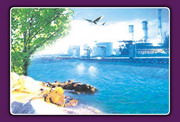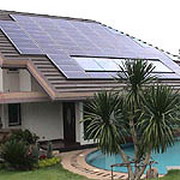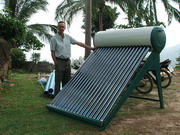|
Thailand is mostly self reliant on it's
production of energy. Electricity is generated using it's own natural
resources such as coal and a recently tapped supply of natural gas from the
Gulf of Thailand. There were attempts to set up an experimental nuclear
reactor but I think that this project has been largely abandoned. Some
electricity is supplied from neighbouring Laos in the north.
|
A change to the statement about nuclear power in
Thailand. Now (2007) the idea has been dusted off and it appears serious
proposals and plans are underway to build not only one
nuclear power plant in Thailand but a whole series of them. There are of
course serious concerns too. Thailand does not have an available supply of
nuclear technicians or even nuclear scientists.
Bangkok Companies has chosen to categorize this
sector of the Thai market into four sections:
|
|
|
-
Main Energy Producers
-
Secondary energy providers
-
Suppliers of energy equipment &
machinery
-
Consultants who work in the energy
sector
Main Energy Producers
There are only a handful of main energy
companies. They produce power primarily through coal and oil/gas powered
generators. A list of these primary energy producers can be found below.
Secondary energy providers
Small, usually experimental, projects have been
set up to try out alternative energy producing methods. Thailand is not
blessed with high mountains and fast flowing rivers so the use of hydro
technology to generate electricity is limited. Winds are not consistently
strong enough to warrant wind turbines being erected. The main area of
interest particularly in rural areas is the use of bio-mass technology.
There are some pilot projects underway and they seem to be showing promise.
One may expect solar power to be a valid option in a tropical climate.
However although the climate may be hot the skies are not always blue.
Furthermore most of the alternative forms of energy production require a
high capital outlay.
The Thai Government, Khun Taksin (a self
confessed and proven technophile) has mooted that more emphasis should be
placed on pursuing alternative energy methods. As yet this seems to be a lot
of hot air and political rhetoric to satisfy the ears of global
environmentalists.
Well the prime minister Taksin Shinawat has gone
but the hot air emitting from the global environmentalists still pollute the
air more than a fleet of Bangkok Buses. Thank goodness more hot air was
avoided by the cancellation of a planned visit by Al Gore. Apparently the
Thai environmentalists couldn't come up with a reputed 100,000$ fee.
Nevertheless the great
Global Warming Scam is starting to show it's ugly face in Thailand and
serving to scare the general Thai population who know no better.
Suppliers of energy equipment & machinery
As with most industrial machinery and equipment
most of the electricity generating equipment needs to be imported. Large
European companies seem to have this corner of the market well sown. There
are opportunities however for other importers and distributors to supply
secondary equipment for these energy producing plants such as air
conditioning equipment, air filters and insulation products.
Consultants who work in the energy sector
Thai companies see the ISO certification system
as a passport to prosperity. Their impression is that an ISO certificate
displayed in the boardroom will impress foreign visitors and buyers. On the
back of the ISO revolution has come a myriad of company and private
consultants who will advise companies on almost anything as long as there is
a budget for it. If there is not a budget then they will try to persuade
them to make one. Energy is not so expensive in Thailand. Certainly not as
expensive as in the west. However companies should save energy 'save the
planet' and in the process save the consultants from going out and finding a
real job. (my comments)
|



